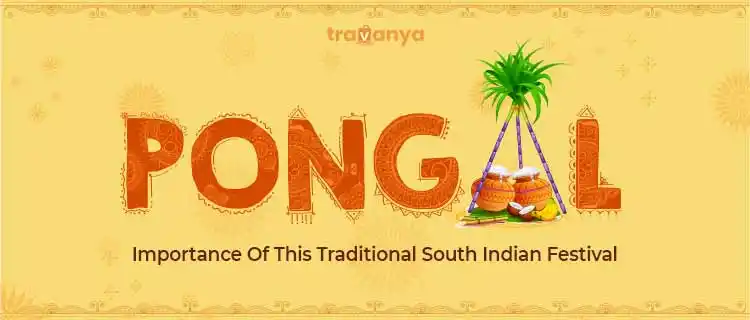
Pongal: Importance Of This Traditional South Indian Festival
Posted on Monday, October 7th, 2024 by Navneet Kaur Leave a Comment
Pongal is the harvest festival that is celebrated in Tamil Nadu. It falls in the month of Thai. Also known as Thai-Pongal, the festival is celebrated with much enthusiasm and devotion. This festival in India marks the beginning of Uttarayan, which is the sun’s northward journey for six months.
Pongal celebration 2023 is on the 15th of January, and it will continue till 18th January.
History of Pongal Festival
The history of the Pongal festival started in the Sangam age, i.e. 200 BC to 300 AD. Pongal was conceived as a Dravidian Harvest festival and had a mention in Sanskrit Puranas.
Also as per famous Hindu Mythology, Lord Shiva once asked Basava, the bull, to visit the Earth and ask the Human to get an oil massage and shower every day. But Basava reported that they eat daily and have an oil bath once a month. This then made Lord Shiva infuriated, and he cursed Basava to live on the Earth forever and said that he had to plough the fields and help people harvest and produce more food. Hence, after harvesting, people celebrate this Pongal festival by worshipping crops and cattle.
Since then, there have been three types of Pongal that are celebrated. They are Bhogi Pongal, Surya Pongal, Mattu Pongal and some of the Tamilians celebrate the fourth day as Kaanum Pongal
Duration of the Festival/ Days of the festival
Pongal festival celebration lasts for four days in India. Different festivities mark each special day. The first day is named the Bhogi festival; the second day is known as Thai Pongal; the Third day is Mattu Pongal and the Fourth day is Kaanum Pongal.
The history of Pongal is evidently traced back to the Sangam Age and is considered to be the ‘Dravidian Harvest festival’. But few historians claim that this festival dates back at least 2,000 years old. It was earlier celebrated as Thai Niradal.
Based on some stories of the legends, during this festive season, unmarried girls beseeched for the agricultural prosperity of the country and observed penance during the Tamil month of Margazhi. They abstained from milk products and didn’t oil their hair throughout the month. They and ceremonial bath strictly withhold harsh words in the early morning is part of the ritual of penance during the Pongal celebration.
Pongal Significance
Pongal festival is one of the major festivals in South India. On this auspicious day, the Sun is worshipped as the embodiment of the force of life. Payasam which is a South Indian traditional sweet is offered to the sun and then eaten as Prasad.
On the second day of the Pongal festival, animals are revered, usually through the worship of a cow, which is again offered sweet payasam.
On the third day, there are more offerings of prayers and distribution of payasam, and, more importantly, through the coming together of family members.
The fourth day is a bonding time that restores deep relationships with the Universe, Mother Nature and one another. Through this festival, the Creation is recognized as the divine blessing as it truly is.
Rituals of the Pongal Festival
The Pongal dish is prepared to mark the Pongal festival. Festivities include adorning cows and their horns, ritual bathing and grand processions. Devotees also decorate and create some rice-powder based kolam artworks, offer respectful prayers in the home and temples, and get together with family and friends.
Pongal Dish
Pongal or Huggi is a famous Indian rice dish. In Tamil, “Pongal” means “To Boil” or “bubbling up”. Pongal is a sweet dish that is made of rice and is mixed with boiled milk and sugar. In Telugu as well, it is known as Pongal.
Travanya is an informative travel portal in India that helps you book affordable flights and holiday packages for travellers who wish to celebrate festivals around the world. If you wish to travel to India to experience the divine festival of Pongal, you can book your flights to India through the Travanya. Also, you will find the latest information regarding affordable flights, travel news, and more. Contact us at +918000235865 to know more about the deals and offers available.
Frequently Asked Questions
Q: Why do we celebrate Pongal?
Answer: Pongal was previously celebrated during the medieval days of the Chola empire. It dates back to 2000 years. It is celebrated to thank the sun god for harvesting and developing crops by giving vitality to them.
Q: When is Pongal celebrated?
Answer: The festival of Pongal is celebrated for four consecutive days. It starts on the 14th of January and continues till the 17th of January. This day also coincides with the festival of Makar Sankranti.
Q: In which state is Pongal celebrated?
Answer: Pongal is widely celebrated in the state of Tamil Nadu.
Q: What rituals does one perform in Pongal?
Answer: To celebrate the auspicious period, people clean their houses and neighbourhood. The whole family takes a bath early in the morning and wears traditional attire for the festivals four days. The women adorn themselves and wear sarees or pavada, while men don the angavastram. Kolam is an essential aspect of the festival. It is a paste and mixture made of rice flour and water or milk or coconut water.
Q: What is the significance of Pongal?
Answer: People who celebrate Pongal show gratitude and thank god for four days during the Pongal festival for agricultural abundance and harvest.
Q: What are some of the famous foods eaten during Pongal?
Answer: Interestingly, Pongal is also the name of the dish made and consumed during this festival. It is a mixture of sweet and boiled rice. It is derived from the Tamil word pong, which suggests to boil over. Sweet Pongal is an essential dish prepared in Pongal. It is made out of harvested rice and offered to the Sun God on the first day of the Pongal festival. It is a tasty dish designed using jaggery, ghee, and dry fruits.
Q: What is the story behind the festival Pongal?
Answer: The most popular legend associated with Pongal is that on the first day, understood as the Bhogi, Lord Krishna lifted Govardhan Mountain in his little finger to protect cattle and people from Indira, the rain god.
The legend states that on the third day of Pongal, Lord Shiva sent his bull to tell people to have an oil bath daily and eat once a month. The bull advised people to eat daily and bathe once a month.
After that, infuriated Lord Shiva sent Nandi on Earth to assist humans to harvest more food, and that is when Pongal became a harvest festival.
Q: Why is it called Ven Pongal?
Answer: Special dishes are prepared during this festival, and the term Pongal means ‘to boil over. There are two primary variants of Pongal; one is popularly called Chakkara Pongal, which is sweet as it is prepared with jaggery, and the other is Ven Pongal, which is savoury and delectable in taste.
Q: What is Pongal also known as?
Answer: Pongal is known by various names in different states of India aside from Thai or Ven Pongal. It is also called Bhogali Bihu, lohri, Bhogi, Makar Sankranti and many more.
About Navneet View All Posts
Navneet Kaur is a Professional Content Writer with 5+ years of experience, she started her career as a Content Writer. Apart from having good knowledge of marketing and business, she firmly believes in dreaming big and making them come true. She lives with a passion to explore and learn about adventure, destinations, history and live events happening around. Including her travel writing skills, she has also written about places, arts and entertainment, personal experiences, nature and its beauty, etc.



Leave a Comment